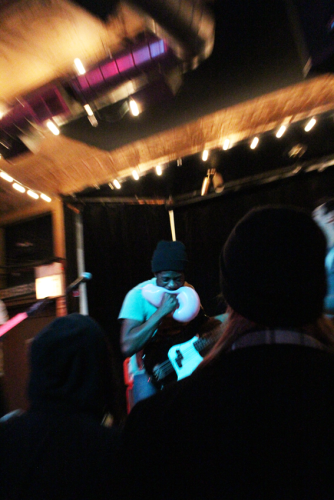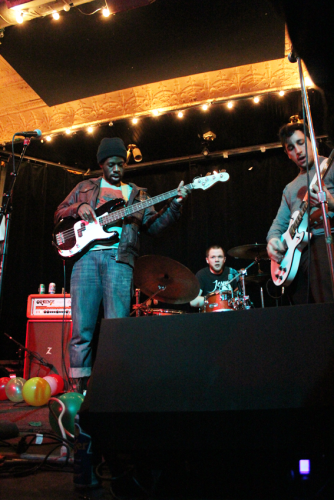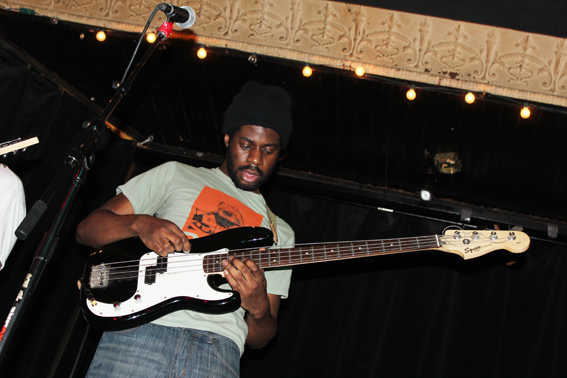Among independent Chicago musicians, multi-instrumentalist Nnamdi Ogbonnaya may have more musical projects than anyone else. In addition to playing and touring with bands like Teen Cult and Nervous Passenger—a math-rock band that recently opened for one of its primary influences, Maps & Atlases—Nnamdi also creates and promotes numerous Bandcamp recordings and YouTube videos, some of which have earned tens of thousands of listens and views. He records his exuberant, spastic solo work under the moniker “Nnamdi’s Sooper-Dooper Secret Side Project.” (NSDSSP), and uploads it to a Bandcamp page of the same name.
Somehow, Nnamdi does all of this while also studying electrical engineering at the University of Illinois at Chicago. Appreciative of both music and machine, Nnamdi counts courses in computer programming as among the most important of his academic experiences. Twice in the past, Nnamdi switched to studying music, but that didn’t make sense, so he went back to engineering. “I’m already doing music all the time,” he says. “I don’t need to go to school for that.” He describes schoolwork not as a bad thing but rather as a “time thing,” since it eats up practice time—he would need more time than school will allow to construct the stage he envisions, which involves a six-part choir, horns, strings, and dancers. But despite the conflicts school causes, Nnamdi says he still badly “wants this degree.”
From grades four through six, Nnamdi took piano lessons. He played marimba and mallets in high school, later relegating that duty to the “other kids [who] were better at it than [him].” When he found drums, he quit piano training. “This is dumb! I wanna play drums!” Nnamdi explains in a prepubescent voice, impersonating himself at that age. He stayed at the drum-kit for nearly his entire remaining grade school career. Asked if he regrets his instrumental choices, Nnamdi is completely secure: “I chose what I chose!”
Nnamdi is a self-taught producer, mixing NSDSSP recordings by himself, “picking up tricks” from records he’s loved in the past. He sees it as a blessing and a curse; when recording albums for Swerp Records, a Chicago label that lasted from 2012 to 2014, Nnamdi had album deadlines but studio time was limited. This was at times stressful, since sometimes Ogbonnaya is “in a mood,” as he says, “where things annoy [him] ‘til they’re perfect,” and he can’t just use the first take.
Ogbonnaya has lived and recorded in Humboldt Park for four years. Originally, he called a 5,000-square-foot warehouse and loft his home, but “that shit fell through” when too many people moved out. In those days, Ogbonnaya would play and host shows in the venue—the Chicago Reader’s People Issue video shows him playing on a broken cymbal in one corner of that former space. After living there, he moved to North Lawndale for three months, but grew disillusioned when he came back from a month-long tour and moved back.

But through all these moves, Nnamdi remains delighted to be a part of the busy and diverse Chicago music scene. “Even if you go to a bunch of shows in Chicago there’s gonna be a bunch of groups of people playing music that you don’t know about,” he says. “I encourage people to go to a show they would never go to or go to a show of bands they’ve never heard of.” He says that shows are “a weird experience. People don’t like being at a place where you don’t know anybody. I feel like people should experience that cause people get too comfortable,” adding that “comfort is good, though, comfort is great! I love air conditioning.”
On a Sunday afternoon in January, I was just about to leave Nnamdi’s Humboldt Park apartment when he told me to wait. “I want to give you something,” he said, and turned to a stuffed duffel bag that he bent to search. “I hope it’s in here,” he said, and soon he extracted Despondent, a white, 7-inch vinyl EP with minimal cover art and a Fair Weather Records sticker inside the plastic.
Though energetic, Despondent is not Nnamdi’s must exuberantly joyful work. Released in 2013, it features more songs that are in line with its titular mood, such as “Glasgow Grin,” a song of empty and numbing partying environments. Its stark black-and-white video displays its aural mode. The song’s raps are pitch-shifted so deep as to feel ceremonially buried. “You don’t always need to be serious,” Ogbonnaya says, about the themes of Despondent, “but sometimes you have to be serious. The heavy stuff is cool too.”
Some of the songs on Despondent were written by Ogbonnaya as early as high school. When reminded that his album Bootie Noir was released in 2013, Ogbonnaya blurts that it’s “so old!”—high school is distant antiquity for him. His new album, titled Drool, will be released in spring, and has been in the works for a year, which in Ogbonnaya’s terms is “forever!” To a musician as prolific as Ogbonnaya, time is defined by numbers of projects and songs; it’s more natural to say “two shows ago” than to say “two weeks ago.”
I thanked Nnamdi for giving me the record. “I’m just glad people listen to it,” he says. Despite his extensive musical experience, Nnamdi reacts with a newcomer’s delight and humility whenever people like his music. When I compared his virtuosity to that of another indie-rock guitar hero, Dave Longstreth of The Dirty Projectors, Nnamdi was honored. “Those are such good things!” he said, in reference to production aspects of Dirty Projectors records which remind me of his own (guitar tones “clear and trebly,” “dumb” songs that are unfathomably intricate). His attitude toward music is focused on learning and self-challenge, and not on audience pleasure per se.

The Monday after I visited Ogbonnaya in Humboldt park, Nnamdi was scheduled to play a show at Schubas Tavern. Openers Regular Oatmeal played a set of what could be called “emo” (though Nnamdi wouldn’t use the term—genre names mostly make him chuckle) and then Teen Cult took the stage. Nnamdi tuned his black bass guitar by playing high, clear chords in accordance with his general preference for “higher, mid-tones.” He had a hoodie on beneath a dirty-looking army coat, but the rest of his clothes were the exact same as those he’d worn the day prior: black baggy jeans and a red-and-black jersey advertising Tim Horton’s in diagonal script.
Ogbonnaya makes sure to laugh with frequency, though onstage he’s not the one telling jokes. Occasionally, when Teen Cult guitarist Ian Sutherland laid down the punchline for “What did Mozart tell Beethoven when he pricked his finger?” (“See? sharp!”), Ogbonnaya spoke with him in unison, though he mostly kept his voice at a low volume, delivering punch lines with his eyes.
When Ogbonnaya graduates from UIC, it’ll be “game over,” and he will dedicate all of his energy to music. Given what he’s accomplished so far, the prospect is staggering to imagine. With Drool still being engineered, and music videos conceptualized for each of its songs, we surely won’t be kept in the dark, only in waiting.

